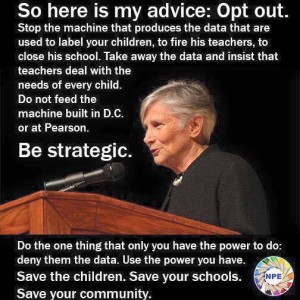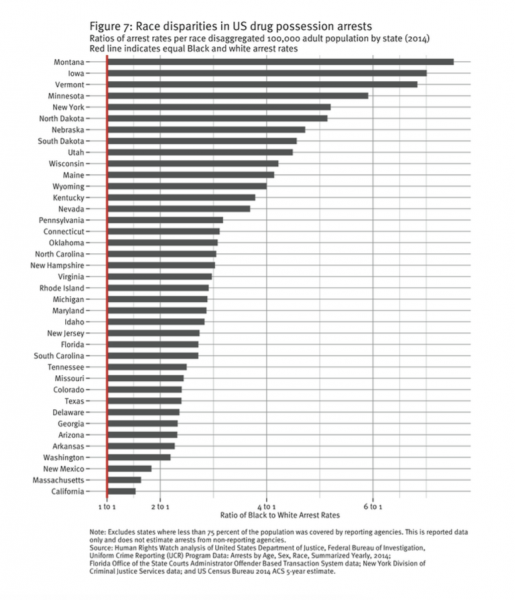 Black Rhode Islanders are almost three times as likely to be arrested for drug charges than white Rhode Islanders, according to a new analysis by the American Civil Liberties Association of Rhode Island.
Black Rhode Islanders are almost three times as likely to be arrested for drug charges than white Rhode Islanders, according to a new analysis by the American Civil Liberties Association of Rhode Island.
“The glaring racial disparities in enforcement of these laws have been going on for too long and must be addressed,” said Steven Brown, executive director of the RI ACLU. “This report is yet another wake-up call about both the overcriminalization of private conduct and the significant racial disparities that permeate our criminal justice system at just about every level.
The report looks at all 50 states done by the ACLU and Human Rights Watch that showed black adults are arrested 2.5 times more often than white adults. In Rhode Island, that ratio is even higher, with 2.9 Black adults arrested for every white adult that is arrested.
Brown said this was “especially troubling” because the report also shows Rhode Island has one of the lowest arrest rates in the nation “per overall population.”
While almost three black Rhode Islanders are arrested for every one white Rhode Islander, there are more than 14 white Rhode Islanders for every one black Rhode Islander. According to the 2010 census, there are 856,000 white Rhode Islanders and only about 60,000 black Rhode Islanders.
Rhode Island has the 21st highest ratio of black-to-white drug arrests in the nation, according to the report. Nearby Vermont has the third highest ratio at 6 to 1 black-to-white drug arrests. Connecticut has the 16th highest average at just over 3 to 1. Massachusetts has the second lowest ratio in the nation at just over 1.5 to 1, second only to California, which is 1.5 to 1.
The national report indicates drugs are the most common reason for arrest made in America and that one of every nine arrests are for drug charges.
“Calling the war on drugs a complete failure that is destroying lives and communities, the report called for decriminalization of personal drug use and possession,” according to a RI ACLU press release. “Instead, the report said, there should be a stronger investment in public health, emphasizing evidence-based prevention; education around the risks of drug use and dependence; and voluntary, affordable treatment and other social services in the community.”
Brown said the new data confirms what the RI ACLU learned when it studied 10 years worth of marijuana arrests in Rhode Island that showed 2.6 to 3.6 black Rhode Islanders were arrested for every white Rhode Islander arrested between 2001 and 2010.
“We hope this report will not only encourage more positive consideration of the marijuana ‘tax and regulate’ bill, but will promote broader efforts by police departments to reconsider how they enforce these particular laws,” said Brown.
Rhode Island continues to take a wait and see approach to legalizing cannabis while Massachusetts voters will decide that question at the ballot this November.


Who among us has never asked for help? Who among us is so self-sufficient that they have never relied on the kindness of strangers? And when we ask for help, or lean on our friends, family or even strangers for support, have we given up our dignity, or are we simply demonstrating our humanity? What, after all, is more human than relying on our greatest strength, each other?
“There is nothing dignified about standing on street corners, or venturing into the middle of the street, dressed in dirty, shabby clothes, in all sorts of weather, with a crude cardboard sign, begging passersby for help,” wrote Bishop Thomas Tobin in a letter to the Providence Journal last week, but he was wrong. Dignity, the state or quality of being worthy of honor or respect, is, by Catholic principle, “inherent and inviolable.” Human dignity has been called the “cornerstone of all Catholic social teaching.”
Humanists affirm the dignity of every human being. A cornerstone Humanist document is the United Nations Universal Declaration of Human Rights. Article 1 states, “All human beings are born free and equal in dignity and rights. They are endowed with reason and conscience and should act towards one another in a spirit of brotherhood.” No distinction is made in the declaration based on class or property.
I’ll avoid the sexist term “brotherhood” (the Declaration was written in 1948 after all) and call it our “spirit of kinship.” This idea, that we are one large human family, reminds us to rely on each other when things go wrong in our lives. Our kinship is a fundamental part of what makes us human, and without it, our society and our lives fracture.
Through this fracturing, people end up on the street, homeless, hungry and alone with their demons. The truth of human dignity means that it should not be the responsibility of the downtrodden to ask for our help. Our own human dignity requires us to offer it.
The Universal Declaration of Human Rights also affirms the human right to expression, the human right to freely move within our cities and as a consequence, affirms our right to ask for assistance.
“The problems [associated with panhandling] have spread since Mayor Jorge Elorza, responding to the threat of action from the American Civil Liberties Union and others, directed that the police should no longer enforce ordinances dealing with panhandling and loitering,” said Tobin in his letter. “The ACLU, while presumably well-intentioned, has done no one a favor.”
In defending the human and constitutional rights of panhandlers, the ACLU respected human dignity in a way Bishop Tobin seems unprepared to do. The “favor” the ACLU did was to remind us that rather than sweeping people in need out of sight, it is far better to provide the things they need to live their lives comfortably.
Some religious leaders understand this, but many others don’t get it, even as they wonder why their moral authority is crumbling.
]]>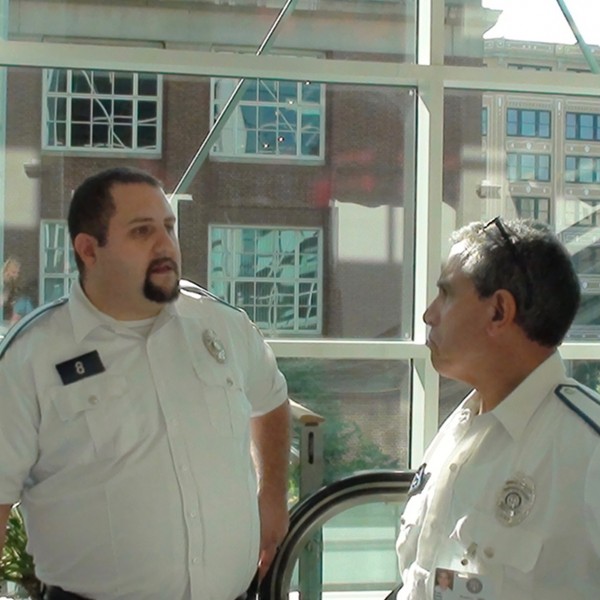 On Wednesday morning, reporters and activists were prevented from attending real estate developer Joseph Paolino’s press conference where he was to announce his plans regarding the issue of homelessness. The behavior of the security guards and police officers at the Providence Convention Center, where the press conference was held, became a preview of what many fear might become the norm if the wrong policies are instituted in downtown Providence.
On Wednesday morning, reporters and activists were prevented from attending real estate developer Joseph Paolino’s press conference where he was to announce his plans regarding the issue of homelessness. The behavior of the security guards and police officers at the Providence Convention Center, where the press conference was held, became a preview of what many fear might become the norm if the wrong policies are instituted in downtown Providence.
As activists and reporters entered the convention center, a security guard raised his hand and stopped everyone cold. “I don’t know where you guys are trying to go,” said the guard, “but I can’t let you guys go anywhere.”
A Providence police officer added that only “designated” people were allow to go up to the fifth floor where the press conference was taking place. It became quickly apparent that the activists and some reporters were not the “right kind of people” for the exclusive press conference.
Calls upstairs to the people in charge were useless. It didn’t matter to the convention center security guards or to the police officers that reporters and city residents were being denied access to a public meeting pertinent to their lives. What mattered, it seemed, was how one was dressed, who you knew, and how security perceived you.
People who were dressed in nice suits and ties, wearing nice clothes and carrying briefcases – or, let’s face it, white and upper class people – were allowed access. If you didn’t fit that bill, you were stopped in the lobby.
WPRO reporter Anita Baffoni was allowed upstairs with another woman who claimed she was a reporter, but RI Future’s Bob Plain was denied. Security claimed that the women had “credentials.” This is a matter in dispute.
Soon, people came downstairs from where the press conference was taking place and started approving some people and turning down others. Again, this was done either from familiarity, i.e. people in positions of authority recognizing each other, or through profiling along racial and class lines.
“It’s a private meeting,” said a man, who suddenly seemed in charge. “We’re trying to treat everyone like ladies and gentlemen,” he said. I countered that he was treating people like “second-class citizens” but he doubled down, saying that that “was absolutely not true.”
Some people were allowed to take the escalator without having so much as a single word or objection from security lobbied at them. These people were white and dressed nicely. For others it became necessary to storm past security and risk arrest if they wished to attend the press conference.
Convention center security eventually admitted that they couldn’t accost people. That didn’t stop them from threatening arrest. The Providence Police who were present were not arresting people, however, even when some activists made it all the way up to the fifth floor and began chanting outside the room where Paolino was holding court.
Is this the future for Kennedy Plaza? Access for some, as long as they look rich and white and have the right connections, while others become subject to ruthless regulations meant to keep us always on the edge of arrest?
Ordinances, such as “banning the distribution of anything to occupants of vehicles” are being proposed to the Providence City Council and being seriously considered. The ACLU’s Steve Brown calls this proposed ordinance “a direct attack on individuals who are struggling with homelessness or poverty and who seek to peacefully exercise their First Amendment rights to solicit donations.”
To his credit, Paolino said that restricting access to some reporters was inadvertent. He said he had no intention of preventing RI Future, the Providence Journal, RINPR and the Providence Business News from attending. But he did want to keep the activists and protesters away. He didn’t want his press conference disrupted.
When we hide our public meetings and press conferences behind security guards and police officers, restricting access to only the “right” people and the proper, embedded media, we set up a system that respects the rights of the rich over the rights of the poor. We set up a two tiered class system of the kind that lifts up some people by stepping on others.
Not unlike what some people would like to see in Kennedy Plaza.
]]>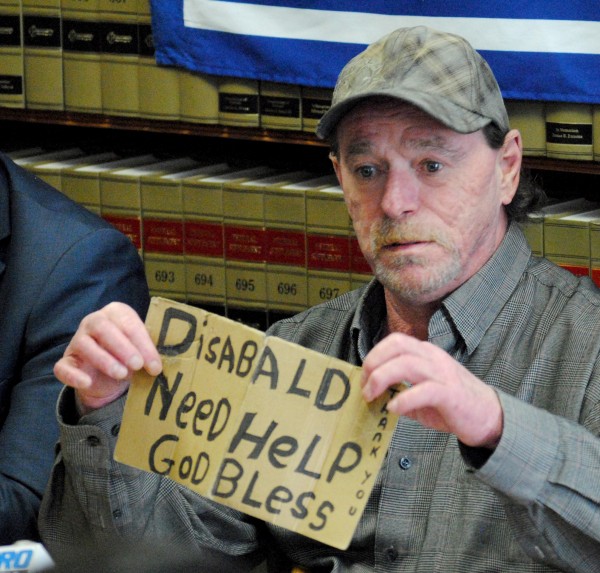 Johnston is the third city in Rhode Island to stop enforcing its aggressive panhandling ordinance after the ACLU of Rhode Island sent the city a letter threatening a lawsuit. Providence and Cranston did so earlier this year.
Johnston is the third city in Rhode Island to stop enforcing its aggressive panhandling ordinance after the ACLU of Rhode Island sent the city a letter threatening a lawsuit. Providence and Cranston did so earlier this year.
“The police chief made the decision not to enforce that ordinance at this time,” said Pawtucket/East Providence Senator Bill Conley, who is also the city solicitor for Johnston. “We’re going to look at how these cases play out in court and revisit the issue.”
The city agreed via a letter not to enforce the anti-panhandling law after receiving a letter from the ACLU.
“We believe that the Town ordinance raises significant constitutional concerns by impinging on the First Amendment rights of the homeless and the poor,” said the letter from ACLU Executive Director Steven Brown dated May 10. “In the past year, in fact, at least three courts elsewhere have struck down laws very similar to the Town’s “aggressive begging” ban. See Thayer v. City of Worcester, 2015 WL 6872450 (D. Mass. 2015); Browne v. City of Grand Junction,2015 WL 5728755 (D. Colo. 2015); and McLaughlin v. City of Lowell, 2015 WL 6453144 (D.Mass. 2015). The unsuccessful defense of these laws has come at great financial expense to those cities.”
ACLU volunteer attorney Marc Gursky hailed the city’s quick decision to suspend the law. “I commend town officials for acting promptly in recognizing their constitutional obligations and in saving taxpayers from the expense of an unnecessary lawsuit,” he said.
“I am optimistic that as municipalities are compelled not to criminalize homelessness and poverty, they will instead collaborate with constituents and other advocates on solutions to these issues, including affordable housing and adequate income supports,” said Megan Smith, an outreach worker with House of Hope, an organization that helps homeless people.
Conley said it would be up to the city council to repeal the law. He doesn’t think Johnston police officers will still enforce it. “If that happened I think the chief would remind that officer that department policy is not to do that,” he said.
Providence agreed to stop enforcing its aggressive panhandling law in February – a move that drew the ire of downtown business interests. Courts have recently struck down laws targeting aggressive panhandling, saying panhandling is constitutionally protected speech and noting other laws cover aggressive behavior.
The ACLU, in its press release, said, it “is engaged in ongoing efforts to challenge and repeal laws that disproportionately affect the rights of the homeless” but said no further actions are planned at this time. RI Future is researching whether other communities have such laws.
Correction: An earlier version of this post neglected to mention that Cranston stopped enforcing its aggressive panhandling ordinance.
]]>
Out in Chicago, the Caucus of Rank and File Educators has created a treasure trove of anti-testing materials we want to share with parents and students who in turn can share it with peers. This is certain to annoy people like Andy Moffit, the charter school champ and husband of Gina Raimondo, Edward Achorn, the Providence Journal editor whose wife is a charter school proponent, and a slew of others who make a career out of advocating for the privatization of our public schools.
Saying no to PARCC is a pro-union, pro-child, pro-teacher act that would make the rich and powerful look bad.
It is worthwhile to repeat what was said by the RI ACLU in November 2015 regarding the previous school year’s test results: Though not surprising, the test results released this week show that using PARCC as a graduation requirement would have barred the vast majority of Rhode Island students from receiving a diploma. Worse, and just like the NECAP, it would have disproportionately affected students of color, students with disabilities, and ESL students in a devastating manner.
In a statement regarding this year’s testing the ACLU said:
The ACLU of RI does not oppose the implementation of PARCC testing per se. We recognize that standardized assessments can, if prepared and used properly, provide information to school districts and to students that can help target appropriate support services. However, we strongly oppose the use of PARCC, or any other standardized written test, as a high school graduation requirement or for any other punitive purpose, such as grading students. This high-stakes testing has a clear discriminatory impact on students of color, English Language Learners, and students with disabilities. Further, students’ grades or graduation prospects should not be based on flawed standardized tools that cannot take into account an individual student’s actual work in school. They should serve as a guide, not punishment. We are currently examining the policies of each school district to find out whether they plan to use the test for such purposes.
The ACLU does not take a position on refusal to take the test but, “it is critical that schools make clear to parents whether there are any potential adverse consequences that flow from taking the test.”
CLICK HERE TO LISTEN TO ERIC DRAITSER’S EXCELLENT PODCAST WITH JIA LEE OF CORE AND MERCEDES SCHNEIDER, EDUCATION SCHOLAR AND ACTIVIST!
]]> If you’ve ever wanted to make a difference in the fight to protect and promote civil liberties right here in Rhode Island, advocating at the State House is a great way to make your voice heard.
If you’ve ever wanted to make a difference in the fight to protect and promote civil liberties right here in Rhode Island, advocating at the State House is a great way to make your voice heard.
The 2016 General Assembly is in full swing and lawmakers are considering hundreds of important pieces of legislation that could have serious impacts on our rights. The ACLU of Rhode Island is at the State House nearly every day to weigh in on these bills, and having civil libertarians like you behind us truly makes a difference. That’s why we want to teach you how to be a better advocate!
This Saturday, February 20, advocates and two former lawmakers will lead an ACLU Advocate Training Session at the Warwick Public Library at 2:30 PM to share their experiences and advice on how to make your voice heard in Rhode Island. After the afternoon session, you’ll be ready to follow important civil liberties legislation; reach your legislators; connect with fellow advocates; and testify before committees. If you can’t make it this Saturday, the ACLU will host another training at the Rochambeau Library on Saturday, February 27 at 1 PM.
You don’t need any prior experience to learn how you can make Rhode Island a better place for your family, friends, and neighbors!
Join ACLU advocates and volunteers on:
2:30 to 4 PM
600 Sandy Lane Warwick, RI 02889
OR
1 to 2:30 PM
708 Hope Street Providence, RI 02906
No experience necessary. All are welcome.
]]>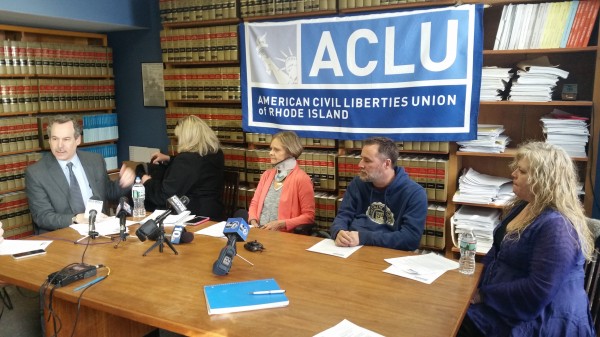 Rhode Islanders who use medical marijuana to help manage chronic and debilitating medical conditions spoke out today against a proposal in Governor Gina Raimondo’s 2017 budget that would levy heavy taxes on medical marijuana plants grown by patients and caregivers.
Rhode Islanders who use medical marijuana to help manage chronic and debilitating medical conditions spoke out today against a proposal in Governor Gina Raimondo’s 2017 budget that would levy heavy taxes on medical marijuana plants grown by patients and caregivers.
At a news conference held by the American Civil Liberties Union of Rhode Island (ACLU) and the RI Patient Advocacy Coalition, patients said this “sick tax” on medical marijuana would be devastating to them and many other patients and caregivers, making it extremely difficult, if not impossible, for them to access the medicine they need to manage their pain and other medical symptoms. The proposed tax, the groups said, has generated a palpable fear in the patient community and should be struck from the proposed budget.
“If these changes become law, I will be effectively forced out of the medical marijuana program,” said Peter Benson, an East Greenwich resident and medical marijuana patient who is paraplegic and uses medical marijuana to control painful and persistent muscle spasms. Benson broke his neck in a bicycle accident when he was 17. He is confined to a wheelchair. Benson called the governor’s tax “an absolutely cruel proposal.”
“Medical marijuana gave me my life back and my relationship with my wife and daughter,” said Benson. Marijuana controls the painful spasms and allows him to hold his daughter in his lap.
According to a fact sheet prepared by the Governor’s office, the new tax would impose a $150 per plant charge on patients lawfully growing marijuana for medical purposes, and a $350 per plant charge for caregivers volunteering their time and energy to grow plants for sick patients. The proposal also reduces the number of plants that patients can grow.
Ellen Smith, from Scituate, is both a medical marijuana patient and a caregiver for five other patients. She said of the proposed tax: “It would add more than $8,000 a year to the cost of growing medicine for my patients. They can’t afford it and neither can I. It is breaking our hearts.”
Smith remembers meeting candidate Raimondo who promised that she supported the medical marijuana law. Voting for Raimondo is a vote she regrets. Under the Governor’s proposal “gifting” the donation of excess marijuana to those who cannot afford to purchase it, will be taken away. Smith does all she can to care for the patients she provides for, and gifts all excess marijuana to the needy. Now she literally fears for her life and the lives of her patients.
“I will not only lose my patients, I will lose my purpose in life,” said Smith, who says the anxiety over this proposal has contributed to her suffering. One night, during a particularly bad breathing episode, she comforted herself that perhaps her death might be used to convince the Governor to change her mind.
The Governor’s fact sheet claims that each marijuana plant is “estimated to generate an average of $17,280 of annual revenue for a caregiver,” and that therefore the tax “amounts to just 2 percent of the value of marijuana produced.” But JoAnne Leppanen, executive director of the RI Patient Advocacy Coalition, noted that patients and caregivers are growing the plants for medical purposes only and make no money from the plants. “These plants produce medicine, not money,” said Leppanen.
Leppanen pointed to the difficulties and costs patients already face in growing marijuana, and said: “This is a draconian proposal based on fictional numbers that undermines the purpose of the medical marijuana program. It will wreak havoc on the lives and health of thousands of Rhode Islanders.”
“If one marijuana plant was worth $17,000 we’d be having this meeting in Hawaii,” said Benson.
A plant big enough to be worth $17,000 would be the size of the State House Holiday Tree, said Leppanen.
Bobby Brady-Cataldo was the second patient in Rhode Island to be legally able to used medical marijuana. All the marijuana she gets to treat her symptoms of MS is gifted. 80 percent of my money goes to my mortgage, she said, and she would not be able to afford medical marijuana otherwise.
The Governor’s proposal means, “people can’t give me medicine that literally saved my life. Is this ignorance or cruelty?” asked Brady-Cataldo. “They’ll give me Vicodin or Oxy, they’ll give me a drug habit, but they won’t help me.”
Steven Brown, executive director of the ACLU of Rhode Island, added: “Having a medical marijuana program means little if the state makes it impossible for all but the wealthy to actually participate in it. The patients and caregivers affected by this proposal grow medical marijuana to ease their symptoms and to help others; they are not running a lucrative drug trade. The state should treat them just as they would any other patient using legal medication. Imagine charging sick patients prescribed codeine a special tax based on the street value of the medication if they illegally sold it. We fervently hope the Governor will take this troubling tax proposal off the table.”
The ACLU has long supported the availability of medical marijuana for patients who could benefit from its use.
]]> oin the ACLU of Rhode Island and the Brown University Chapter of ACLU-RI on Thursday, February 4, for a free screening of Citizenfour and a discussion of surveillance and privacy in the digital age.
oin the ACLU of Rhode Island and the Brown University Chapter of ACLU-RI on Thursday, February 4, for a free screening of Citizenfour and a discussion of surveillance and privacy in the digital age.
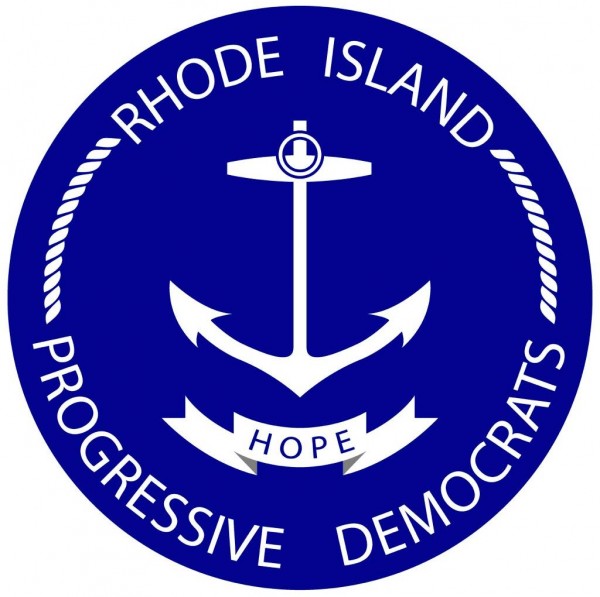 During the 2014 gubernatorial race, Gina Raimondo made a campaign promise to the Immigrants in Action Committee that she would sign an executive order within her first year, issuing licenses to undocumented immigrants within Rhode Island. Raimondo further made her support clear in an ACLU questionnaire, that asked: “Do you support providing driver’s licenses to undocumented immigrants?”, to which Raimondo responded: “YES. I was the first candidate in the gubernatorial race to explicitly call for driver’s licenses for undocumented immigrants. This is an issue of fairness and public safety.” However, January 6 has gone by, marking the end of Raimondo’s first year as Governor, and instead of issuing an executive order, Raimondo has responded with inaction.
During the 2014 gubernatorial race, Gina Raimondo made a campaign promise to the Immigrants in Action Committee that she would sign an executive order within her first year, issuing licenses to undocumented immigrants within Rhode Island. Raimondo further made her support clear in an ACLU questionnaire, that asked: “Do you support providing driver’s licenses to undocumented immigrants?”, to which Raimondo responded: “YES. I was the first candidate in the gubernatorial race to explicitly call for driver’s licenses for undocumented immigrants. This is an issue of fairness and public safety.” However, January 6 has gone by, marking the end of Raimondo’s first year as Governor, and instead of issuing an executive order, Raimondo has responded with inaction.
Speaker Mattiello encouraged the Governor to bring up the issue “legislatively,” so that public comment could be heard, and that legislators could then form a position on the issue. However, it is very unlikely that the General Assembly will act on this issue. In 2014, for instance, H 7262 was referred to the House Judiciary, and the hearing on it was postponed at the request of the bill sponsor. In the Senate, a similar fate befell its version of the bill: S 2241 was sent to the Judiciary Committee, and was simply not heard. In 2013, S 422 was referred to the Judiciary Committee, and sent to “further study” – effectively killing the bill. Thus, judging by these prior attempts, Raimondo’s choice to pursue the legislative route to address this “issue of fairness and public safety” is unlikely to result in meaningful legislative action, especially when the Judiciary Committees and Speaker Nicholas Mattiello remain determined to obstruct any opportunity of passing legislation to correct this longstanding wrong in the State of Rhode Island.
The Rhode Island Progressive Democrats continues to urge Governor Raimondo to issue an executive order, as she promised Rhode Island’s voters and the immigrant community during her campaign.
[From an RIPDA press release]
]]> The ACLU of Rhode Island works tirelessly to defend fundamental rights here in the Ocean State. Now, it’s time to celebrate that work. Join us on Thursday, October 22, at the Providence Biltmore to take part in our Annual Meeting Celebration and raise a glass to another year of protecting civil liberties. This year, the ACLU of Rhode Island is honoring the Rhode Island Coalition for the Homeless and homeless rights advocate Megan Smith as the 2015 “Raymond J. Pettine Civil Libertarian of the Year” award recipients.
The ACLU of Rhode Island works tirelessly to defend fundamental rights here in the Ocean State. Now, it’s time to celebrate that work. Join us on Thursday, October 22, at the Providence Biltmore to take part in our Annual Meeting Celebration and raise a glass to another year of protecting civil liberties. This year, the ACLU of Rhode Island is honoring the Rhode Island Coalition for the Homeless and homeless rights advocate Megan Smith as the 2015 “Raymond J. Pettine Civil Libertarian of the Year” award recipients.
The ACLU of RI is honoring the Coalition and Ms. Smith for their unyielding advocacy for the civil rights and liberties of individuals experience homelessness, and for the invaluable support and resources they provide. The RI Coalition for the Homeless works to promote and preserve the dignity and quality of life for men, women, and children by pursuing comprehensive and cooperative solutions to the problems of housing and homelessness. Ms. Smith is an outreach worker and case manager with PATH, a program of the House of Hope CDC that works primarily with individuals experiencing street homelessness. Both are also tireless advocates for policies and reforms that affirm the rights of the homeless and protect individuals experiencing homelessness from discrimination.
ACLU supporters will mix, mingle, and enjoy hors d’oeuvres and cocktails while they celebrate the civil liberties successes of the past year and recognize the hard work of these two honorees dedicated to protecting the rights of the homeless.
ACLU of RI volunteer attorneys Sonja Deyoe, Carly Iafrate, and Neal McNamara will also provide updates on their ongoing and important court cases.
Celebrate your rights and freedoms, honor the RI Coalition for the Homeless and Ms. Smith, and support the ACLU of Rhode Island by purchasing your ticket today!
Tickets for the evening are $65 and are available for purchase online or by calling the ACLU office (401-831-7171). RSVP by October 14.
ACLU of Rhode Island’s Annual Meeting Celebration
Thursday, October 22 at 6 P.M.
(Registration begins at 5:30 P.M.)
Providence Biltmore
11 Dorrance St., Providence, RI 02903
Complimentary valet parking provided to all guests.
]]>